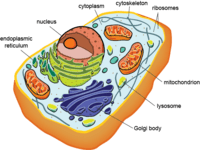
Cell Types - Bell Ringer
Biology
10th - 11th Grade
NGSS covered
Used 70+ times

AI Actions
Add similar questions
Adjust reading levels
Convert to real-world scenario
Translate activity
More...
Content View
Student View
10 questions
Show all answers
1.
MULTIPLE CHOICE QUESTION
30 sec • 1 pt

Which of the following statements is not part of the cell theory?
Tags
NGSS.MS-LS1-1
2.
MULTIPLE CHOICE QUESTION
30 sec • 1 pt
What structures distinguish a plant cell from an animal cell?
3.
MULTIPLE CHOICE QUESTION
30 sec • 1 pt

Which organism is made up of cells that have both a cell membrane and a cell wall?
Tags
NGSS.MS-LS1-1
4.
MULTIPLE CHOICE QUESTION
30 sec • 1 pt
The ___ is the basic unit of sturucture and function of organisms
Tags
NGSS.MS-LS1-1
NGSS.MS-LS1-2
5.
MULTIPLE CHOICE QUESTION
30 sec • 1 pt
The Cell Theory states...
Tags
NGSS.MS-LS1-1
6.
MULTIPLE CHOICE QUESTION
30 sec • 1 pt
Which cell is a prokaryote




7.
MULTIPLE SELECT QUESTION
30 sec • 1 pt
Which cell is a eukaryote?




Tags
NGSS.MS-LS1-1
NGSS.MS-LS1-2
Access all questions and much more by creating a free account
Create resources
Host any resource
Get auto-graded reports

Continue with Google

Continue with Email

Continue with Classlink

Continue with Clever
or continue with

Microsoft
%20(1).png)
Apple
Others
Already have an account?
Similar Resources on Wayground

10 questions
cell theroy
Quiz
•
10th Grade

10 questions
Neural Control and Coordination- Quiz 11
Quiz
•
11th Grade

12 questions
Cellular Energy Vocabulary
Quiz
•
10th Grade - University

10 questions
Endonucleases, ligases and polymerases
Quiz
•
10th - 12th Grade

10 questions
The Skeleton and Joints
Quiz
•
8th - 10th Grade

10 questions
SUBSISTENCE FARMING
Quiz
•
11th Grade

15 questions
SUPPORT & LOCOMOTION PART 1
Quiz
•
11th Grade

15 questions
IB Biology The Liver
Quiz
•
11th - 12th Grade
Popular Resources on Wayground

15 questions
Fractions on a Number Line
Quiz
•
3rd Grade

10 questions
Probability Practice
Quiz
•
4th Grade

15 questions
Probability on Number LIne
Quiz
•
4th Grade

20 questions
Equivalent Fractions
Quiz
•
3rd Grade

25 questions
Multiplication Facts
Quiz
•
5th Grade

22 questions
fractions
Quiz
•
3rd Grade

6 questions
Appropriate Chromebook Usage
Lesson
•
7th Grade

10 questions
Greek Bases tele and phon
Quiz
•
6th - 8th Grade
Discover more resources for Biology

20 questions
Food Chains and Food Webs
Quiz
•
7th - 12th Grade

65 questions
Review for TEST 1
Quiz
•
9th - 10th Grade

10 questions
Exploring Food Webs and Energy Pyramids
Interactive video
•
6th - 10th Grade

15 questions
Cell Cycle
Quiz
•
10th Grade

5 questions
Inherited and Acquired Traits of Animals
Interactive video
•
4th Grade - University

48 questions
Unit 8B: Plant System
Quiz
•
9th - 12th Grade

36 questions
DNA & Protein Synthesis 3.1.1-3.1.3
Quiz
•
9th - 12th Grade

44 questions
Population Variation and Biotechnology
Quiz
•
9th - 12th Grade
